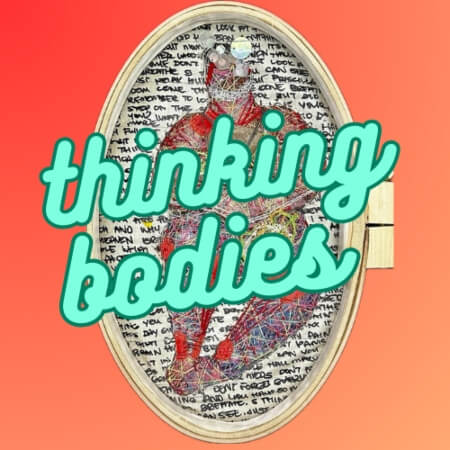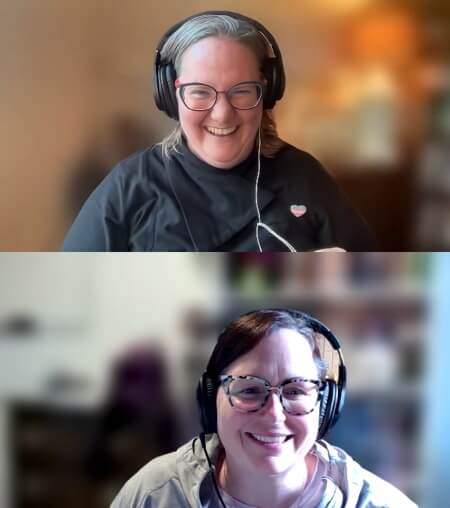Can a feminist philosophy podcast be both scholarly and entertaining? Dr. Kristin Rodier sure thinks so
Dr. Kristin Rodier had two goals in mind when she co-created a new podcast on feminist philosophy.
 The first was to challenge the idea that legitimate research only counts when academics publish in a traditional peer-reviewed journal. And second, she wants to introduce feminist philosophy to a wider audience outside the ivory tower.
The first was to challenge the idea that legitimate research only counts when academics publish in a traditional peer-reviewed journal. And second, she wants to introduce feminist philosophy to a wider audience outside the ivory tower.
"I think my podcast is research," said Rodier, an associate professor in Athabasca University's Faculty of Humanities and Social Sciences. "In a way, I'm sort of addressing the question, 'What if there was a better way than waiting two years for a journal article to come out?'"
Rodier created the podcast with research collaborator and feminist philosopher Dr. Anna Mudde of the University of Regina. Through three episodes and counting of Thinking Bodies: A Feminist Philosophy Podcast, Rodier believes they're delivering on both goals. And perhaps just as importantly, they're learning a lot about mobilizing research in new ways—and having fun.
"Thinking Bodies is a way of giving people something that recreates my interaction with ideas that I find so fun and exciting and challenging, and sometimes very sad," Rodier said. "This is the most excited I've been about a project since my dissertation."
Podcasting school for academics
Podcasts continue to grow in popularity with nearly 12 million Canadian adults having listened to one in the past month. At AU, Dr. Nisha Nath is a producer on Academic Aunties, and Dr. Chris McTavish co-hosts the bi-weekly podcast Philosophy in Film.
The origins of Thinking Bodies date back to spring 2024, when Rodier attended a podcasting workshop for academics. Hosted by the Amplify Podcast Network and funded by the Social Sciences and Humanities Research Council (SSHRC), the five-day workshop introduced participants to multiple examples of the types of tone, style, and format that are possible through podcasting. Much of that content had a focus on social justice issues, Rodier said.
"It was about finding your voice as a marginalized scholar and finding your public," she said.
Critically, the sessions also introduced Rodier and Mudde to podcasts created for academic and general audiences alike—and to mentors such as Dr. Hannah McGregor, who produced the first-ever peer-reviewed podcast series Secret Feminist Agenda, and Helen Zaltzman, host of The Allusionist.
By the end of the week, Rodier and Mudde had not only conceived of their new show, they recorded a trailer for the series.
"We are trying to approach Thinking Bodies like we're curious graduate students," explained Rodier. As hosts, their goal is to engage with listeners like it's a lively feminist seminar. While they don't simplify their critiques and analysis, Rodier said listeners don't need a doctorate in feminist philosophy to enjoy being part of these important discussions.
Podcasts are a kind of experimental conversational method aimed at a popular audience.
Removing research silos
Though she doesn't dismiss the importance or impact of traditional academic writing, podcasting gives Rodier a new way to pursue collaborative research. Prior to Thinking Bodies, much of her research and practice as a feminist philosopher was independent.

"We don't 'co' a lot in philosophy," she said, referring to co-authorship of papers.
Episodes in the series focus on older philosophical works such as Sue Campbell's Being Dismissed and Iris Marion Young's Throwing Like a Girl, which Rodier said continue to be helpful in making sense of complex social issues and day to day experiences.
At Zaltzman's suggestion, Rodier and Mudde decided to include the voices of guest contributors, which Rodier adds was like an "aha moment."
"I was like, 'That's it. That's the piece of the philosophy conversation that gets their literal voice,'" she said. "We can read a quotation from someone, but the vibe completely shifts when you have someone else's actual voice come in."
Before recording, Rodier, Mudde, and the guest contributors use the selected text as a starting point for critical reflection. Guests offer their views in self-recorded clips, while the two hosts respond to the analysis and relate the text to their own experiences.
Rodier likened the post-production work of editing audio and weaving in a full episode arc to editing an essay.
The result is a series that not only tackles important topics in feminist philosophy, it delivers in a way that entertains and, hopefully, gets people to pay attention to an important field.
In a sense, it was like we had a mission. If we love feminist philosophy and think it should be read more and talked about more, how do we do that?
Listen to episodes, read transcripts, and learn more about Thinking Bodies.
A university Like No Other
Athabasca University is a university like no other, uniquely focused on the core priorities of access, community, and opportunity.